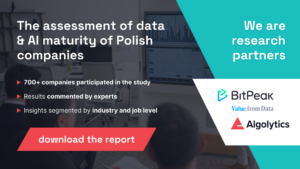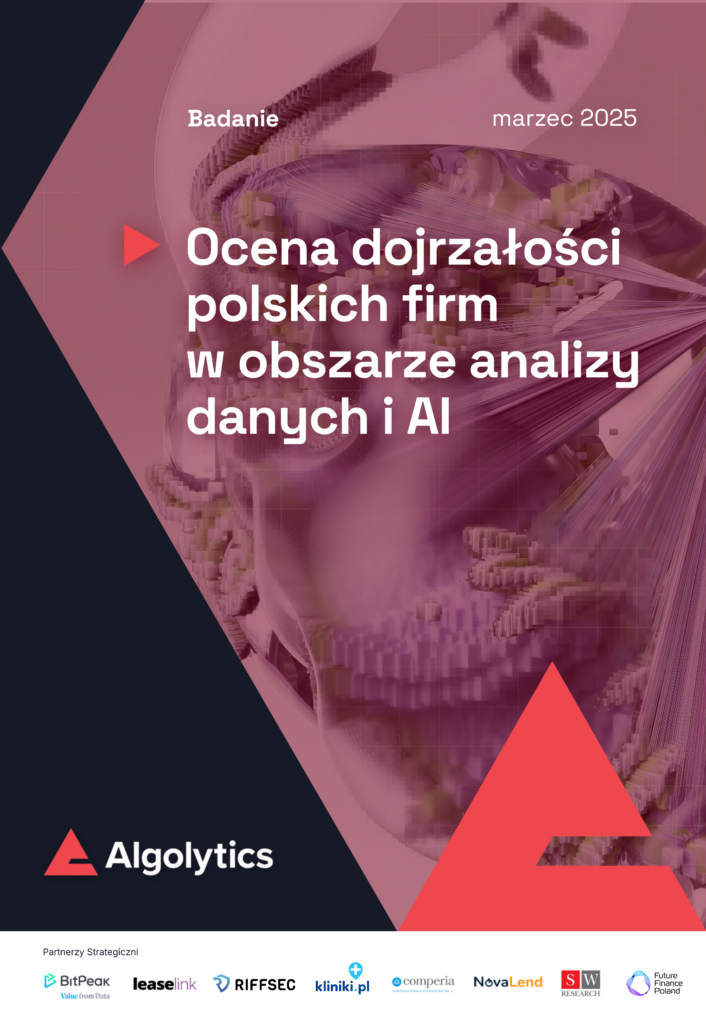Are Polish companies ready for the era of artificial intelligence? The answer is in the latest report, „Assessment of data & AI maturity of Polish companies”, complied by Algolytics with our support as a Strategic Partner.
The results are now out! You can download the full report by clicking the link. The report is in Polish.
What’s in the report?
- How Polish companies use data and AI in their daily business processes – based on responses from over 700 organizations, broken down by industry and job levels.
- Expert commentary that thoroughly describes key challenges and market development directions
Data quality – a problem or an underestimated area?
Sebastian Kamiński, BitPeak CEO, shared his insights on actions undertaken to improve the quality, accessibility, and frequency of data usage. Real-time data quality auditing and monitoring and investment in tools that enhance data quality remain at a similar level—around 30%.
„Such a low score on an issue that directly impacts users’ trust in data raises concerns. It may suggest that data quality is not perceived as a widespread problem, but my experience tells a different story. This remains a significant challenge, especially in large, long-established organizations,” comments Sebastian Kamiński.
„These two areas are closely interconnected, although clients often treat them as separate domains. Investing in the right tools to improve data quality enables automation and streamlining of the work done by data monitoring teams. Given the scale of data quality challenges, this result may indicate that the topic is not receiving the attention it deserves from companies. Without high-quality data, we cannot build user trust, which is absolutely essential if an organization wants to make data-driven decisions,” underlines BitPeak CEO.
Awareness of the benefits of using data and AI
Sebastian Kamiński shared his perspective on estimating the benefits and costs of data, analytics, and artificial intelligence projects.
„It’s often said that data is the gold of our times, yet research shows that only 50% of companies truly recognize its real benefits. So, what’s happening in the other organizations? Personally, I see the issue as a lack of internal education and insufficient promotion of solutions that could genuinely improve day-to-day work,” explains Sebastian Kamiński. „To change this, it’s worth building strong foundations: creating knowledge bases, organizing training sessions, and providing space to experiment with technology.”
Ultimately, education, investment in knowledge, and raising user awareness turn people into true ambassadors of change within an organization.
A few key figures form the report
- 71.6% of companies report using AI, but most often it’s limited to just 1–3 technologies, primarily LLMs, NLP, and RPA. This reflects an early stage of adoption and a need for further development.
- Only 29.8% of organizations take a strategic approach to data and analytics, while as many as 15.5% do not invest in developing these competencies.
- The most advanced departments in AI implementation are IT (56.7%), BI/Data Science (53.5%), customer service (51.9%), and product development (50.3%).
- Only 20.3% of companies apply a strategic AI approach across the entire organization; the rest limit it to specific departments or do not implement AI.
- Just 48.1% of companies can assess the benefits of data and AI development, while 52.4% are aware of the costs of poor data quality—this highlights significant gaps in business awareness.
- The main barriers to AI implementation include lack of budget, technical and business competencies, and IT/analytics resources—recurring challenges across all types of organizations.
- Only 38.6% of large companies take a strategic approach to data despite having greater resources. This suggests the issue lies more in awareness and mindset than in capacity.
- Lower-level employees are three times less likely than managers to say that data is used in decision-making—a clear sign of communication and education gaps within companies.
- AI is most commonly used for IT automation, BI forecasting, customer service (chatbots, sentiment analysis), and optimization in logistics and finance (e.g., risk or fraud analysis).
- The top concerns around AI include the risk of layoffs (32.5%), lack of competencies (approx. 30%), exposure of inefficiencies, and legal regulations—factors that significantly hinder adoption.
Click on the cover to download the full report.
Strategic Partners
BitPeak, LeaseLink, RIFFSEC, Kliniki.pl, ComperiaRaty, SW Research, Novalend
Research Partners
Krajowa Izba Gospodarcza, SpeedUp, Fundacja Lendtech, brave Conferences, Huge Thing, Autopay, Centrum Monitoringu Danych, Future Finance Poland, Polski Związek Instytucji Pożyczkowych, Polski Związek Zarządzania Wierzytelnościami, Strix, Business Centre Club, Związek Przedsiębiorstw Finansowych, Izba Gospodarki Elektronicznej


 (+48) 508 425 378
(+48) 508 425 378 office@bitpeak.pl
office@bitpeak.pl










